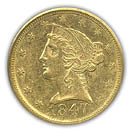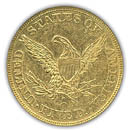$10 Liberty


Description
Note the same design, experienced a change in diametric size after 1840. This created a thicker coin which was more easily struck with greater detail. Because detail was likely enhanced at production, the type set collector will have no problem acquiring one of the more plentiful dates in any desired grade from Very Fine through AU, with a typical grade encountered being Very Fine to Extremely Fine. Uncirculated pieces are scarce, and superb Uncirculated coins are very rare. Proofs were made in limited quantities and are rarities.
The Coronet design, also called the Liberty Head or Braided Hair type, made its appearance in the half eagle series in 1839. The obverse depicts a female head facing left, her hair tied in a bun secured by a string of beads, wearing a coronet inscribed LIBERTY, stars surrounding, and with the date below. The reverse shows an eagle with a shield on its breast, perched on an olive branch and holding three arrows. The inscription UNITED STATES OF AMERICA, FIVE D. surrounds.
Coinage was accomplished at the Philadelphia Mint on a continuous basis during the span indicated. Additional pieces were made from time to time at Charlotte, Dahlonega, New Orleans, and San Francisco. In general, Charlotte and Dahlonega pieces are scarce.
Valuation
The prime rarity is the 1854-S, struck during the first year of operation of the San Francisco Mint, a coin of which only three are known to exist today.
- COIN NAME
- $10 Liberty
- DESIGNED BY
- Christian Gobrecht
- ISSUE DATE
- 1839-1866
- COMPOSITION
- 0.900 part gold, 0.100 part copper
- DIAMETER
- 22.5 mm (1839-1840); 21.6 mm (1840-1866)
- WEIGHT
- 129 grains
- EDGE
- Reeded
- BUS MINT
- 9,114,049
- PROOF MINT
- 450 (estimated)
The statements made on this Website are opinions only. Past results are no guarantee of future performance or returns. Precious metals, like all investments, carry risk. Precious metals and coins may appreciate, depreciate, or stay the same depending on a variety of factors. Lear Capital, LLC cannot guarantee, and makes no representation, that any metals purchased will appreciate at all or appreciate sufficiently to make customers a profit. Lear is a retail seller of precious metals and its buyback (or bid) prices are lower than its sell (or ask) prices. Metals must appreciate enough to account for this difference in order for customer to make a profit when liquidating the metals. Lear does not provide financial advice or retirement planning services. The decision to purchase or sell precious metals, and which precious metals to purchase or sell, are the customer’s decision alone, and purchases and sales should be made subject to the customer’s own research, prudence and judgment.



